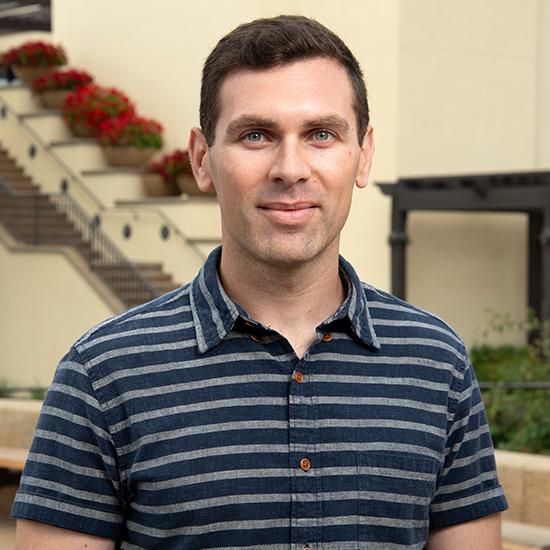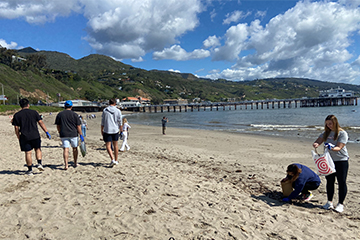English Professor Martin Premoli Examines the Relationship Between Storytelling and the Environment in New Book

In his recent book, Global Fictions and Environmental Disaster: Imagining Survival on Our Changing Planet, Martin Premoli, Seaver College assistant professor of English, examines the topic of storytelling through an environmental lens, focusing on how contemporary literature shapes one’s understanding of disaster phenomena such as hurricanes, droughts, species extinction, and agricultural collapse.
“The heart of this book is focused on how storytelling helps us comprehend environmental disasters in intimate, felt ways,” says Premoli. “Storytelling, even if people maybe don't read as much as they did in the past, continues to be a crucial way in which we understand all kinds of social, cultural, and political issues today.”
Published by Bloomsbury Academic on September 4, 2025, Premoli’s book provides a thorough breakdown of how contemporary literary voices from the Global North—made up of wealthier, industrialized countries—and the Global South—generally less developed, less affluent nations—compare in their experiences of natural disasters of recent growing magnitude and related climate concerns. Drawing upon both cultural studies and environmental science, Premoli further examines the environmental philosophies of globally marginalized communities while exploring how narrative can illuminate the complex power dynamics and asymmetries that shape changing environments.
Structuring the book into five chapters, Premoli devotes the initial four to a comparative analysis of two contemporary novels written by authors of the respective aforementioned geographic areas that involve the same environmental disaster in their narratives. Rather than placing these texts in opposition, Premoli explores how the two perspectives inform one another.
For example, the opening chapter of Premoli’s book focuses on Atlantic hurricanes that have impacted both the US Gulf Coast—part of the Global North—and the Caribbean—part of the Global South. Referencing Jesmyn Ward’s novel, Salvage of the Bones (2011), and Monique Roffey’s Archipelago (2012), Premoli analyzes how each author’s use of storytelling elements—such as plot and pacing—reveals insights into their regions’ response to hurricane devastation.
From gaining a holistic understanding of natural disasters of increasing severity and their effects on human beings, Premoli hopes for his readers to practice greater environmental consciousness in their daily lives along with prompting proactive support for global communities recuperating from natural disasters.
“Everyone is facing natural disasters, as seen recently by the Pepperdine community in Malibu with the wildfires,” says Premoli. “But at the same time, it's true that communities in the Global South feel repercussions on an even deeper level. So I wanted to think of this problem not as an ‘us versus them’ situation, but instead consider ways in which perspectives from the Global North and perspectives from the Global South can speak to each other.”
 Premoli's Beach Reading class cleaning Malibu beaches
Premoli's Beach Reading class cleaning Malibu beaches
At Seaver College Premoli integrates environmental humanities into courses on global and Anglophone literature. One of Premoli’s English classes called Beach Reading often meets along Malibu beaches to examine literary texts while reflecting on the environmental and spiritual significance of the ocean. Premoli and his students have partnered with the Surfrider Foundation to serve coastal communities, putting into practice the values and lessons they have meditated on through literature.
“As a culture we need to be reflecting on questions about our current ethics and values that relate to the natural world,” explains Premoli. “I think literature is a useful tool for exploring those questions in ways that other fields aren’t designed to. While focusing on questions of ethics, values, and mortality, literature creates a space for readers to think about these social and cultural concerns, alongside the equally important political, legal, and scientific concerns.”